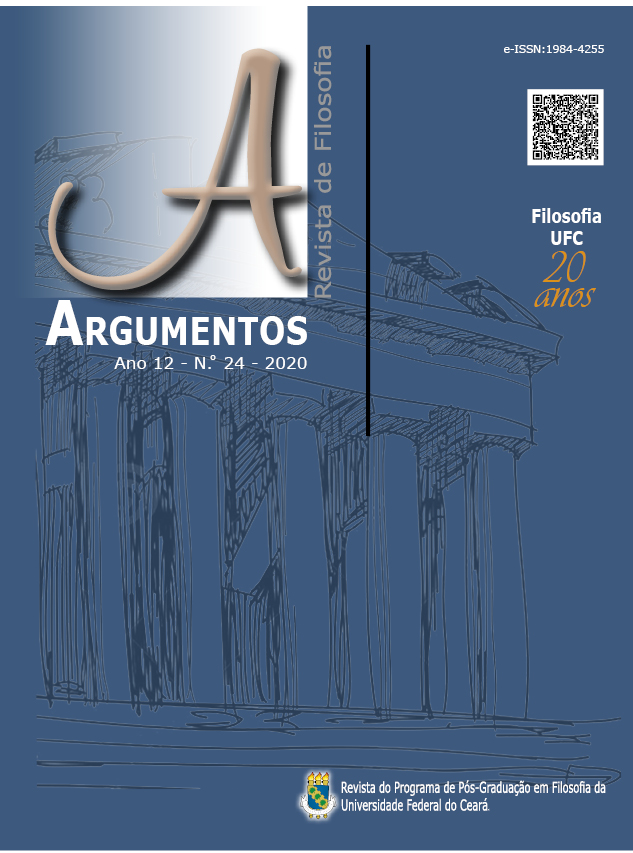On the tractarian logical space’s fragmentation
DOI:
https://doi.org/10.36517/Argumentos.24.18Keywords:
Logical Space. Philosophy of Logic. Wittgenstein. Holism.Abstract
Here I defend that the systems of propositions (Satzsysteme) in the middle period of Wittgenstein's Philosophy represent the development of the tractarian notion of logical space after the Color Exclusion Problem. I aim then to deal with some essential features of these emergent systems, namely: 1. the radicalization of a kind of holism to be found already in the Tractatus; 2. the exclusion by contrariety, which shows the insufficiency of contradiction in capturing finer conceptual exclusions; 3. the asymmetric negation, which allows the explosion of alternatives and overcomes the tractarian bipolarity; and 4. the mandatory exhaustion (completeness) of possibilities, i.e., all possible articulation of conceptual elements must be totally provided in a system.
Downloads
References
BARTLEY III, William Warren. Wittgenstein. The Anchor Press Ltda. London, 1977
CUTER, João Vergílio. Números e cores. doispontos, Curitiba, São Carlos, vol. 6, n. 1, p.181-193, abril, 2009.
ENGELMANN, Mauro. Wittgenstein’s Philosophical Development: Phenomenology, Grammar, Method, and the Anthropological View. Hampshire: Palgrave Macmillan, 2013.
HACKER, Peter. Insight and Illusion: themes in the Philosophy of Wittgenstein. Oxford: Clarendon Press, 1986.
HINTIKKA, M. B. & HINTIKKA, J. Investigating Wittgenstein. Oxford. Blackwell, 1986.
KIENZLER, Wolfgang. Wittgensteins Wende zu seiner Spätphilosophie, 1930-32. Eine historische und systematische Darstellung. Frankfurt am Main: Suhrkamp, 1997.
MARION, Mathieu. Wittgenstein, Finitism, and the Foundations of Mathematics. Clarendon Press, Oxford, 1998.
PRADO NETO, Bento. Fenomenologia em Wittgenstein: tempo, cor e figuração. Rio de Janeiro: Editora UFRJ, 2003.
RUSSELL, Bertrand. Introdução ao Tractatus. Tradução de Luiz Henrique Lopes dos Santos. In. Tractatus Logico Philosophicus. São Paulo: EdUSP, 1992.
RUSSELL, Bertrand. The Autobiography of Bertrand Russell 1914-1944, Boston: 1951.
SILVA, Marcos. Wittgenstein, Cores e Sistemas: aspectos lógico-notacionais do colapso do Tractatus. Analytica, Rio de Janeiro, vol 15 no 2, p. 229-264, 2011.
SILVA, Marcos. Holismo e Verofuncionalidade: Sobre um conflito lógico-filosófico essencial. Philósophos, Goiânia, v.18, n. 2, p. 167-200, jul/dez, 2013.
SILVA, Marcos. Two Forms of Exclusion Mean Two Different Negations. Philosophical Investigations (UK). July 2016 39 (3): 0190-0536, 2016a.
SILVA, Marcos. On a Philosophical Motivation for Mutilating Truth Tables. Nordic Wittgenstein Review. pp. 105–126. Eds. Anne-Marie Søndergaard Christensen, Martin Gustafsson, Yrsa Neuman. vol. 5, no. 1 (June). 2016b.
SILVA, Marcos. Could Wittgenstein still be held as a father of truth tables? O que nos faz pensar, [S.l.], v. 25, n. 39, p. 123-146, jan. 2016c.
SILVA, Marcos. Wittgenstein on Contradiction and Contrariety: Four Turning Points in the Development of his Philosophy of Logic. In M. Silva (ed.), Colours in the Development of Wittgenstein’s Philosophy. Cham: Palgrave, 2017.
WITTGENSTEIN, Ludwig. Philosophische Bemerkungen. Werkausgabe Band 2. Frankfurt am Main: Suhrkamp, 1984.Werkausgabe Band 3: Suhrkamp Taschenbuch Wissenschaft. Frankfurt am Main, 1984.
WITTGENSTEIN, Ludwig. Tractatus Logico-philosophicus. Traduzido por José Arthur Giannotti. Companhia Editora Nacional: Sao Paulo, 1968.
WITTGENSTEIN, Ludwig. Tractatus Logico-philosophicus. Traduzido por Luiz Henrique dos Santos. São Paulo: EdUSP, 2001.
WITTGENSTEIN, Ludwig. Tractatus Logico-philosophicus. Traduzido por D. F. Pears and B.F. McGuinness. London: Routledge & Kegan Paul LTD, 1974.
WITTGENSTEIN, Ludwig. Wittgenstein und der Wiener Kreis. Werkausgabe Band 3. Frankfurt am Main: Suhrkamp, 1984.
Downloads
Published
Versions
- 2025-03-28 (2)
- 2020-08-03 (1)
How to Cite
Issue
Section
License
Copyright (c) 2020 Argumentos - Revista de Filosofia

This work is licensed under a Creative Commons Attribution 4.0 International License.
Argumentos magazine is licensed under an International Creative Commons Attribution License.
The Magazine uses CC BY inclusion
1) The authors retain the copyright granted to the magazine or the right to initial publication, with the work regularly licensed under the Creative Commons Attribution, which allows the sharing of the work with acknowledgment of authorship and initial publication in this magazine.
2) The authors are authorized to contract additional applicable contracts, for non-exclusive distribution of the version of the work published in this journal (for example, publication in the institutional repository or as a chapter of the book), recognition of authorship and initial publication in this journal.
3) Authors are authorized and encourage to publish and distribute their work online (for example, in institutional repositories or on their personal pages) at any time before or during the editorial process, as they can generate productive changes, as well as increase the impact and reference of published work.




.jpg)










._._3.png)
1.jpg)
._._._.png)
